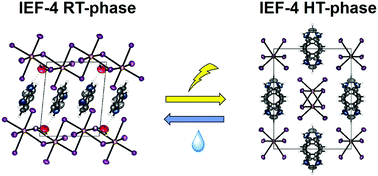Reversible dehydration–hydration process in stable bismuth-based hybrid perovskites†
Abstract
Lead-free hybrid perovskites have attracted significant attention due to the toxicity of lead and poor stability of lead hybrid perovskites. Among them, bismuth-based hybrid perovskites are currently being developed as they possess negligible toxicity, moderate price and great stability. Herein, we report the synthesis of two stable organic–inorganic perovskites based on one-dimensional iodobismuthates and the benzimidazolium cation (BzlmH)+. Firstly, the BzImH[BiI]4·H2O structure (IEF-4 RT-phase) was prepared using a simple and fast synthetic method at room temperature, leading to the dehydrated BzImH[BiI]4 (IEF-4 HT-phase) upon the removal of water by soft heating. This dehydration-hydration process, which has never been reported for Bi-based perovskites, is fully reversible, affecting the optoelectronic properties of the solid, with an optical bandgap of ∼2 eV. Furthermore, this perovskite material formed stable and homogeneous thin films, which exhibited a high absorption coefficient (1.5 × 105 cm−1) comparable to that of the CH3NH3PbI3 lead perovskite. Thus, both the optoelectronic properties and air stability of these perovskites make them suitable as absorber materials in solar cells.



 Please wait while we load your content...
Please wait while we load your content...